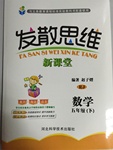题目内容
Find ways to praise your students often, and you ________ they will open their hearts to you.
- A.are going to find
- B.have found
- C.find
- D.will find

 发散思维新课堂系列答案
发散思维新课堂系列答案There's a lot of discussion these days about healthy kids. People who care (parents, doctors, teachers, and others) want to know how to help kids be more healthy.
Being healthy is a way of saying a person eats well, gets a lot of physical activity (exercise), and has a healthy weight. If you're healthy, your body works well, feels good, and can do all the things you want to do. Here are five rules to live by, if you're a kid who wants to be healthy.
Eat a Variety of Foods, Especially Fruits and Vegetables. You may have a favorite food, but the best choice is to eat a variety. If you eat different foods, you're more likely to get the nutrients(营养) your body needs. Taste new foods and old ones you haven't tried for a while. Get at least five servings of fruits and vegetables a day — two fruits and three vegetables.
Drink Water and Milk Most Often. When you're really thirsty, cold water is the No. 1 for you. Kids need calcium(钙)to build strong bones, and milk is a great source of this mineral. How much do kids need? Aim for 3 cups of milk per day. You can mix it up by having milk and some other calcium-rich dairy foods .
Be Active.One job you have as a kid — and it's a fun one — is that you get to figure out which activities you like best. Not everyone loves baseball or soccer. Ask your parents to help you do your favorite activities regularly. Find ways to be active every day. You might even write down a list of fun stuff to do, so you can refer to it when your mom or dad says it's time to stop watching TV or playing computer games!
1. What’s the best title for this passage?
A. Do Your Favorite Activities Regularly B. Eat More Fruits and Vegetables Every Day
C. Drink Water and Milk When You Are Thirsty D. Tips on How to Keep Healthy
2. Which of the following can’t show a kid is healthy?
A. Eating well B. Having too much sleep
C. Having a healthy weight D. Getting a lot of physical exercise
3. The best way to get enough nutrients for your body is ________.
A. to drink milk every day B. to eat what you haven’t eaten before
C. to eat all kinds of foods D. to eat fruits and vegetables instead of grains
4.The underlined words “this material” in the fourth paragraph refer to _________.
A. calcium B. calcium-rich dairy food C. milk D. nutrients
A new study warns that about thirty percent of the world’s people may not have enough water by the year 2025.
An American organization called Population Action International did the new study. It was more than three hundred and thirty-five million people lack enough water now. The people live in twenty-eight countries. Most of the countries are in Africa or in the Middle East.
Population Action International researcher Robert Engelman says by the year 2025, about three thousand million people lack water. At least 18 more countries are expected to have serious water problems. The demand for water keeps increasing. Yet the amount of water on the earth the same. Mr Engelman says the population in countries that lack water is growing in these countries will continue to increase.
The report says lack of water in the future may result several problems. It may increase health problems. Lack of water often means drinking water is not safe. Mr Engelman says there are problems all over the world because of diseases such as cholera that are carried in water.
Lack of water also may result in more international conflict. Countries may have to fight for water in the future. Some countries, such as Syria, Sudan, Cambodia, and so on, now get sixty percent of their fresh water from other countries. And the report says lack of water would affect the ability to improve their economies. This is because industries often need a large amount of water.
The Population Action International study gives several ways to solve the water problem. One way is to find ways to use water for more than one purpose. Another way is to teach people to be careful not to waste water. A third is to use less water for agriculture. The report also says long-term solutions to the water problem must include controls on population growth.
1.According to the report, how many countries will lack water by the year 2025?
|
A.More than eighteen |
B.About twenty-eight |
|
C.Less than forty |
D.At least forty-six |
2.____ million will lack water by the year 2025?
|
A.335 |
B.3,000 |
C.3,305 |
D.355 |
3.Which of the following is NOT true according to the passage?
|
A.The amount of the water on earth will always stay the same. |
|
B.The report gives three solutions to water problem. |
|
C.M ost of the countries that lack water belong to the developing ones. |
|
D.There’s only one long-term solution to solve the water problem, that is we must try our best to control the population growth. |
4.The passage mainly tells us that_____.
|
A.water is very important for any people |
|
B.PAI did a lot of study about water shortage |
|
C.water shortage will be a serious problem facing us in the near future |
|
D.controlling the population is the best way to solve the problem of water shortage |